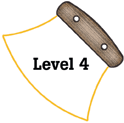
Alaska Science
Key Element C6
 |
Alaska Science |
|
Performance Standard Level 4, Ages 15–18
|
|
|
|
Sample Assessment Ideas
|
Standards Cross-References
|
||
|
National Science Education Standards Science often advances with the introduction of new technologies. Solving technological problems often results in new scientific knowledge. New technologies often extend the current levels of scientific understanding and introduce new areas of research. (Page 192) Creativity, imagination, and a good knowledge base are all required in the work of science and engineering. (Page 192) Because all scientific ideas depend on experimental and observational confirmation, all scientific knowledge is, in principle, subject to change as new evidence becomes available. The core ideas of science such as the conservation of energy or the laws of motion have been subjected to a wide variety of confirmations and are therefore unlikely to change in the areas in which they have been tested. In areas where data or understanding are incomplete, such as the details of human evolution or questions surrounding global warming, new data may well lead to changes in current ideas or resolve current conflicts. In situations where information is still fragmentary, it is normal for scientific ideas to be incomplete, but this is also where the opportunity for making advances may be greatest. (Page 201) |
Benchmarks There are different traditions in science about what is investigated and how, but they all have in common certain basic beliefs about the value of evidence, logic, and good arguments. And there is agreement that progress in all fields of science depends on intelligence, hard work, imagination, and even chance. (Page 13) New ideas in science are limited by the context in which they are conceived; are often rejected by the scientific establishment; sometimes spring from unexpected findings; and usually grow slowly, through contributions from many investigators. (Page 13) |
|
Table of Contents | Return to Alaska Native Knowledge Network